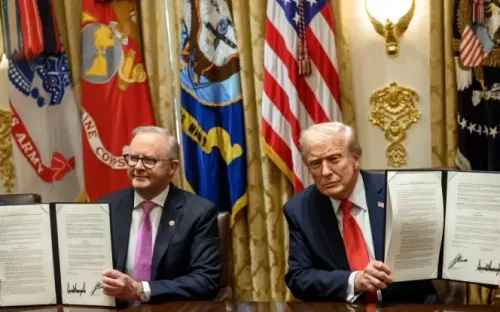Is US Job Growth Stalling with Only 22,000 Added in August?

Synopsis
Key Takeaways
- US added only 22,000 jobs in August, far below expectations.
- Unemployment rate climbed to 4.3 percent, the highest in four years.
- Healthcare sector was a major contributor to job growth.
- Wage growth has slowed significantly.
- Job openings have dropped sharply since 2022.
Washington, September 5 (NationPress) The US economy witnessed a mere 22,000 jobs added in August, significantly under the anticipated 75,000, leading to an increase in the unemployment rate to 4.3 percent from 4.2 percent, representing the highest rate in nearly four years.
The Bureau of Labour Statistics (BLS) released this data, highlighting that gains were primarily in the healthcare and social assistance sectors, while sectors such as technology, retail, mining, and wholesale trade experienced declines.
This slowdown is impacting the US economy comprehensively, with urban tech hubs and manufacturing areas being particularly affected. Notably, healthcare has remained a positive aspect, contributing approximately 31,000 jobs.
Furthermore, The New York Times reported a reduction of 13,000 jobs in June, marking the first net job loss since December 2020.
Wage growth was recorded at 3.7 percent, the slowest since July 2024. Additionally, job openings have plummeted by 45 percent since 2022, indicating a cautious approach from employers amidst ongoing trade tensions.
Recent data also reveals that in July, there were more unemployed individuals than available jobs for the first time since the Covid-19 pandemic, with job openings hitting a ten-month low.
The BLS payroll data, gathered until mid-August, has come under scrutiny following President Trump's dismissal of BLS Commissioner Erika McEntarfer in August, due to allegations of data manipulation. Although revisions are common, the political climate has intensified scrutiny.
Trump has nominated E J Antoni, Chief Economist at the conservative Heritage Foundation, a choice that has faced criticism from numerous economists citing a lack of qualifications.
Experts assert that Trump's global tariffs, coupled with elevated interest rates and economic uncertainty, are hindering job creation.
Nevertheless, the disappointing jobs report has heightened expectations for interest rate reductions, leading to a significant drop in government bond yields, with the two-year Treasury yield reaching its lowest level since 2022.
The Federal Reserve is now under pressure to consider rate cuts at its upcoming meeting on September 17, with futures markets indicating a 70 percent likelihood of a reduction to stimulate job growth.









